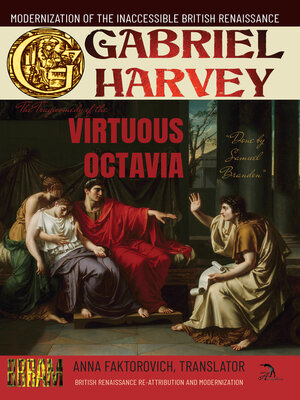The Tragicomedy of the Virtuous Octavia
ebook ∣ British Renaissance Re-Attribution and Modernization, Volume 16 · British Renaissance Re-Attribution and Modernization
By Gabriel Harvey

Sign up to save your library
With an OverDrive account, you can save your favorite libraries for at-a-glance information about availability. Find out more about OverDrive accounts.
Find this title in Libby, the library reading app by OverDrive.



Search for a digital library with this title
Title found at these libraries:
| Loading... |
The first English self-labeled "tragicomedy" about Octavia's failed attempts to win back her inconstant husband, Antony, from his Egyptian lover, Cleopatra, and to prevent her brother, Octavius, from waging retaliatory war on Antony and Cleopatra. This volume presents overwhelming evidence for the re-attribution of the "Samuell Brandon"-bylined "The Virtuous Octavia" (1598) to Gabriel Harvey. The introduction raises questions about potential attribution leads and revealing relevant sources, which are answered with the evidence in the "Primary Sources" section that includes: three letters exchanged between William Byrd and Harvey while both were teaching at Cambridge, the "Octavia to Anthony" poetic epistle from the Arundel Harington Manuscript, and fragments from Plutarch's "Mark Antony" chapter. Frontmatter also explains how Gerard Langbaine created the first "Brandon" biography solely based on the evidence presented in the "Virtuous" play, and without any evidence to support that "Brandon" was indeed a real author, and not merely a fictitious pseudonym. The imaginative process Langbaine used to manufacture "Brandon's" biography is used to explain how scholars have communally arrived at the erroneous current attributions for the texts of the British Renaissance. There are also visual examples of Harvey's handwriting in his signed annotations on Domenichi's Facetie, on "J. Harvey's" "Prophesies", and on Nicolai Machiavelli's "Princeps", and matches these to the handwriting styles currently assigned to two bylines Harvey ghostwrote under: "Edmund Spenser's" poem on a copy of Sabinus' "Poemata" and "Elizabeth I's" letter in Italian to Don Ferdinando de Medici, Grand-Duke of Tuscany. Another section explains how the two dedications to "the virtuous... Mary Thynne" and "the virtuous Lady Lucia Audley" are subversive clues that explain "Virtuous Octavia" as Harvey's rebuttal to Percy's at first anonymous and later "Shakespeare"-bylined "Romeo and Juliet" (1597). "Virtuous" belongs to generic clusters including imitations and translations of the French dramatist Robert Garnier; adaptations of historical plotlines from Plutarch's "Lives"; and imitations of Seneca's tragedies. One of Seneca's tragedies is also called "Octavia"; it is about Emperor Nero's wife of this same name, which had been translated into English by "T. N." back in 1581. There are summaries of the play's critical reception, give ideas to directors on approaches to its staging, and present an extensive synopsis of its narrative. This verse tragicomedy begins after the Treaty of Tarentum has been signed, renewing the power-split of Roman territories between three Emperors: Octavia's brother Octavius is awarded the West, Octavia's husband Antony is awarded the East, and Lepidus receives Africa. Octavia receives news that Antony is living with Cleopatra. When Octavia attempts to bring military reinforcements and to speak with Antony to convince him to return to her, Antony refuses to allow her to come near him. The news of this infidelity enrages Octavius, who decides it is an affront on his own honor, and uses it as a pretext to wage war against Antony, despite Octavia's continuing petitions for peace and reconcilement. Civil and foreign wars are raging in the background, but most of the play focuses on Octavia's philosophical and emotional struggle to comprehend why Antony has chosen to sin, and how she is stoically determined to remain constant and virtuous. In a brief mention in the resolution, Cleopatra causes Antony's tragic death by tricking him into believing she has killed herself, before indeed killing herself. In the forefront of this conclusion, Octavia explains why she continues to be committed to...






